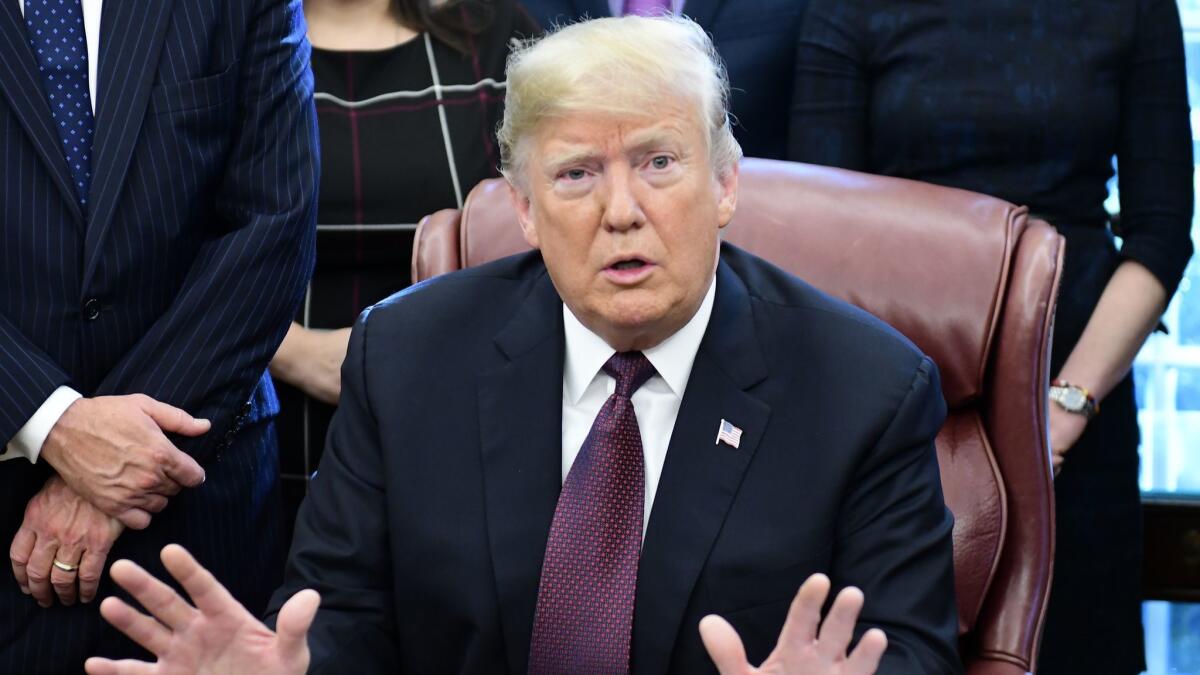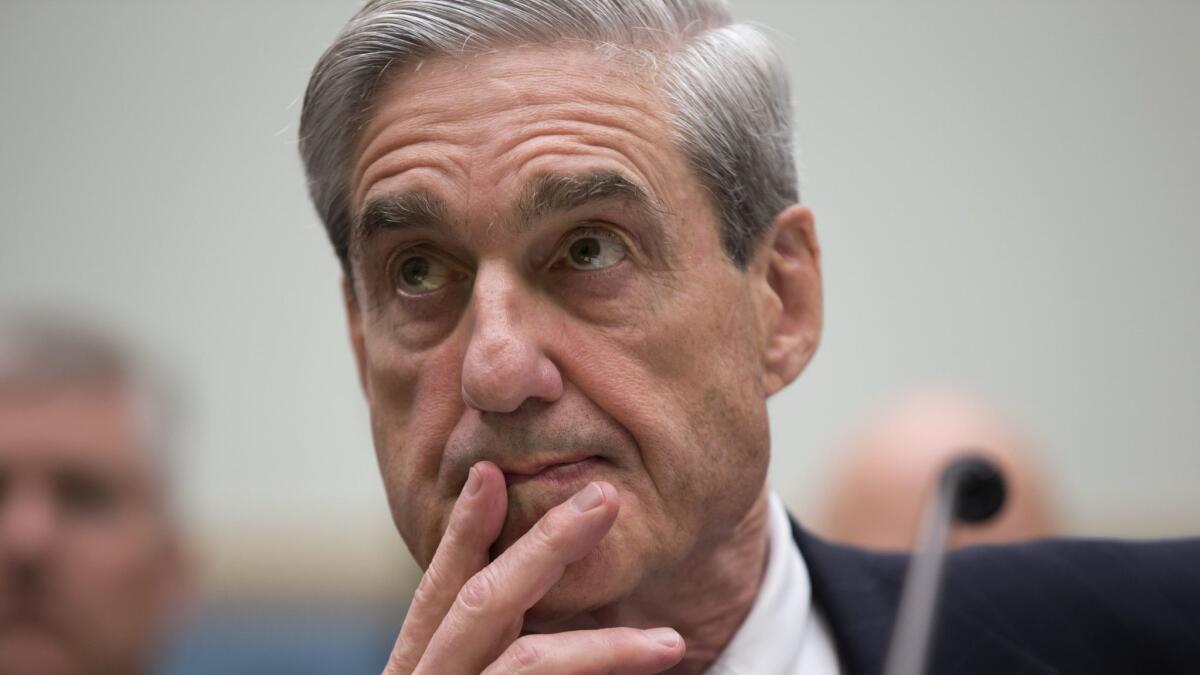Trump says he’s answering written questions from special counsel in Russia inquiry

- Share via
Reporting from Washington — President Trump said Friday that he’s finishing written answers to questions posed by special counsel Robert S. Mueller III in the Russia probe, a potential milestone in the long-running investigation that Trump has repeatedly denounced.
Trump’s responses, once submitted to Mueller’s team, would represent the president’s first official comment to prosecutors in an investigation that has drawn guilty pleas from several of his former top aides and cast a shadow over the White House.
“I’m working on them,” Trump told reporters at the White House when asked about Mueller’s questions.
A person familiar with the process, who declined to speak publicly about the closed-door preparation, said Trump was close to completing his answers. The president said he was handling the issue cautiously because “you always have to be careful answering questions for people who have bad intentions.”
Trump has repeatedly blasted the Russia investigation as a witch hunt, and on Thursday he renewed his attacks, slamming the probe on Twitter as “a witch hunt like no other in American history.”
“The inner workings of the Mueller investigation are a total mess,” he tweeted. “They have found no collusion and have gone absolutely nuts.”
Although the president has met with his legal team this week, he told reporters he’s handling the answers himself.
“My lawyers aren’t working on it,” he said. “I’m working on it. My lawyers don’t write the answers.”
The specific questions posed by Mueller’s team have not been made public.
Rudolph W. Giuliani, the former mayor of New York who is representing the president, told the Washington Post on Thursday that all the questions involve events before the 2016 election.
If that’s the case, the queries don’t involve Mueller’s related examination of whether Trump obstructed justice by trying to influence the outcome of the investigation with the firing of FBI Director James B. Comey or other actions.
Although Trump bragged on Friday that he’s handling the questions “very easily,” Giuliani suggested that some “create more issues for us legally than others” and were “possible traps.”
Mueller began seeking an interview with Trump months ago, eventually agreeing to submit some queries in writing. There’s a precedent — in 1987, President Reagan answered written questions during the investigation into illegal funding of Nicaraguan rebels with profits from the covert sale of missiles to Iran, which became known as the Iran-Contra scandal.
It’s not known if Mueller will continue to push for an in-person interview with Trump, or even issue a subpoena to force his testimony, after getting the written answers.
Independent counsel Ken Starr brought President Clinton before a grand jury in 1998, questioning him about his affair with White House intern Monica Lewinsky.

Trump has denied any conspiracy with a Russian-backed intelligence operation that hacked Democratic Party emails and spread disinformation on social media to boost his campaign against Hillary Clinton in 2016.
The president’s answers come as oversight of Mueller’s investigation is shifting. After the Nov. 6 midterm election, the president forced out Atty. Gen. Jeff Sessions and installed Sessions’ chief of staff, Matt Whitaker, as his temporary replacement.
Until now, Deputy Atty. Gen. Rod Rosenstein had been supervising the special counsel’s office because Sessions recused himself. However, Whitaker will assume that responsibility, according to the Justice Department, which alarms critics because Whitaker was a vocal critic of Mueller’s work before he joined the Justice Department last year.
Whitaker disagreed with the decision to appoint a special counsel last year, and he insisted there was no conspiracy between Trump’s team and the Russians, dismissing a key question the investigation has sought to answer.
Follow the latest news of the Trump administration on Essential Washington »
Trump’s decision to name Whitaker as acting attorney general renewed a push on Capitol Hill for proposed legislation that could shield Mueller from being improperly fired.
“Mueller has been accused repeatedly and without basis in fact of conducting a witch hunt ... by none other than the president of the United States,” Sen. Jeff Flake (R-Ariz.) said on the Senate floor on this week.
The bipartisan legislation would allow the courts to determine whether a special counsel was being fired for good cause, then block the ouster if appropriate.
“This bill is designed to do one thing — protect the integrity of the special counsel’s investigation,” Flake said.
Senate Majority Leader Mitch McConnell (R-Ky.) has opposed the measure. Even if it passed the Senate, it would be unlikely to survive in the House, which is controlled by Republicans until the new Democratic majority assumes power in January when the next congressional session begins.
“I don’t see any reason to tell the president we don’t trust him on this, and you’re not going to get very many Republicans voting for that, at least not in the House,” said Rep. Tom Cole (R-Okla.).
Although Trump has insisted he has the power to fire anyone he wants at the Justice Department, Cole said he doesn’t believe the president would move against Mueller.
“If he wanted to end the investigation — I know he doesn’t like it — but his calculation’s always been to allow it to move to a conclusion,” Cole said.
Mueller has indicted or secured guilty pleas from four former Trump advisors, 25 Russians, three Russian companies, one California man and a former London-based lawyer. Trump’s former lawyer, Michael Cohen, also pleaded guilty in New York in a separate criminal case arising from the Russia investigation.
Although no Americans have been charged with conspiring with Moscow to influence the election, more charges could be coming. Jerome Corsi, a far-right political commentator and conspiracy theorist, said this week that he has met with Mueller’s prosecutors over the last two months and expects to be indicted for allegedly lying to them.
“I was doing my best to cooperate,” Corsi said in a YouTube broadcast Monday. “Evidently it wasn’t good enough.”
Corsi, 72, is an associate of Roger Stone, a longtime Trump advisor who has faced scrutiny for alleged ties to WikiLeaks, which released hacked Democratic Party emails in 2016. Corsi and Stone have denied any wrongdoing.
The founder of WikiLeaks, Julian Assange, is apparently already facing a possible prosecution, although it’s unclear if the case is connected to the Russia investigation. The existence of sealed charges was accidentally revealed in a court filing in an unrelated case in Virginia.
Staff writers Del Wilber and Jennifer Haberkorn contributed to this report.
Twitter: @chrismegerian
UPDATES:
1:20 p.m.: This story was updated with additional details.
12:05 a.m.: This story was updated with additional details about the Mueller investigation.
This story was published at 9:30 a.m.
More to Read
Get the L.A. Times Politics newsletter
Deeply reported insights into legislation, politics and policy from Sacramento, Washington and beyond. In your inbox three times per week.
You may occasionally receive promotional content from the Los Angeles Times.











